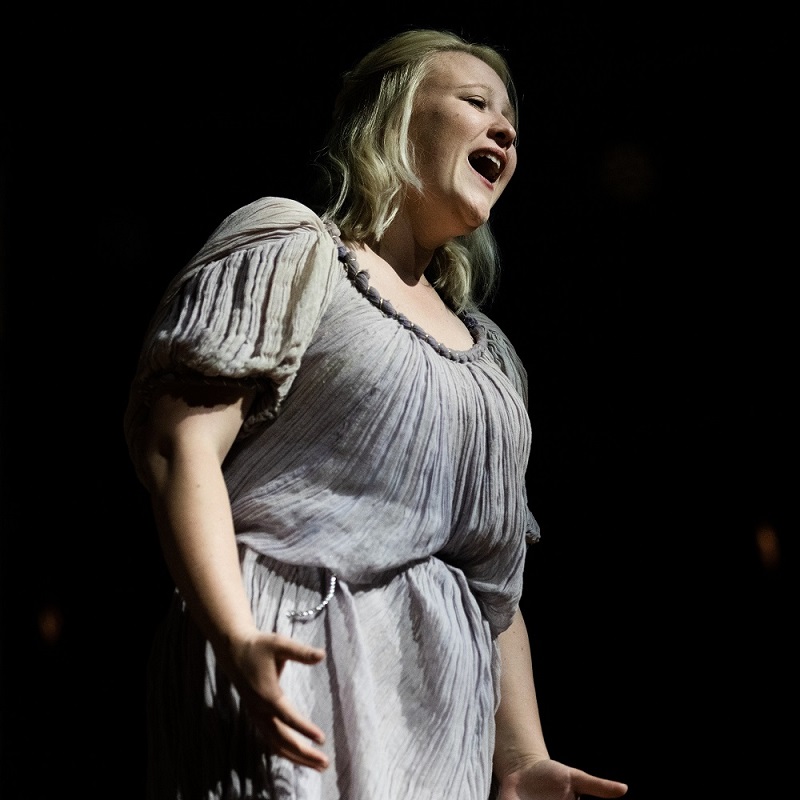Bauci e Filemone/Orfeo, Classical Opera, QEH review - a star Orpheus is born | reviews, news & interviews
Bauci e Filemone/Orfeo, Classical Opera, QEH review - a star Orpheus is born
Bauci e Filemone/Orfeo, Classical Opera, QEH review - a star Orpheus is born
Mezzo Lena Belkina and two others shine, but all is not well in Gluck's mythological world

All happy 18th century couples are alike, it seems, and that makes for a certain placidity in Gluck's pastoral Bauci e Filomene for the (unhappy) wedding of Ferdinand, Duke of Parma and Maria Amalia, Archduchess of Austria. All unhappy couples are unhappy in different ways, especially if the marital misunderstanding takes place when you're bringing your wife back from the land of the dead.
 Classical Opera's Jupiter, the modest Ian Page, conducted his hand-picked players with the usual verve and point, magnificent in storms and Fury-blasts. There were two drawbacks on this occasion, though. He usually casts singers to perfection, but Rebecca Bottone was having a bad night, pitchwise, as sweet Bauci, who gets a ridiculously elaborate and daftly high-lying aria in contradiction of all Gluck's operatic reforms. The staging of the first opera was decidedly a hindrance rather than an enhancement. You can't blame director John Wilkie for not knowing what to do with placid happiness, but someone should have said no to the costumes. Rope-girt classical tunics aren't a good look at the best of times, but Gwilym Bowen must have known he looked daft in his less-than-godly get-up (pictured above). Still, he sang with surprising heft, the Mozart tenor to the life and a little bit more as Gluck tries to beef up the drama with a bit of bad Jupiter tonans behaviour.
Classical Opera's Jupiter, the modest Ian Page, conducted his hand-picked players with the usual verve and point, magnificent in storms and Fury-blasts. There were two drawbacks on this occasion, though. He usually casts singers to perfection, but Rebecca Bottone was having a bad night, pitchwise, as sweet Bauci, who gets a ridiculously elaborate and daftly high-lying aria in contradiction of all Gluck's operatic reforms. The staging of the first opera was decidedly a hindrance rather than an enhancement. You can't blame director John Wilkie for not knowing what to do with placid happiness, but someone should have said no to the costumes. Rope-girt classical tunics aren't a good look at the best of times, but Gwilym Bowen must have known he looked daft in his less-than-godly get-up (pictured above). Still, he sang with surprising heft, the Mozart tenor to the life and a little bit more as Gluck tries to beef up the drama with a bit of bad Jupiter tonans behaviour.
 Undoubtedly the star of the evening, though, was Belkina. Discreet as Filemone, she held the stage throughout as Orfeo, lacerating grief and boundless love personified. Without dance distraction - the three movement folk played a minimal role - you realise that Gluck's finely honed retelling of opera's favourite mythical subject is more monodrama than anything else, at least until the crucial journey from the underworld with Orfeo forbidden to look back at his resurrected wife. Belkina has a seamless, rich vocal range and it probably helped her youthful mezzo that Gluck modified or transposed upwards the leading role when it passed from castrato Gaetano Guadagni, creator of Orfeo in 1762, to his soprano-castrato counterpart in Parma seven years later; no digging here for exaggerated chest-voice effects.
Undoubtedly the star of the evening, though, was Belkina. Discreet as Filemone, she held the stage throughout as Orfeo, lacerating grief and boundless love personified. Without dance distraction - the three movement folk played a minimal role - you realise that Gluck's finely honed retelling of opera's favourite mythical subject is more monodrama than anything else, at least until the crucial journey from the underworld with Orfeo forbidden to look back at his resurrected wife. Belkina has a seamless, rich vocal range and it probably helped her youthful mezzo that Gluck modified or transposed upwards the leading role when it passed from castrato Gaetano Guadagni, creator of Orfeo in 1762, to his soprano-castrato counterpart in Parma seven years later; no digging here for exaggerated chest-voice effects.
Bottone was on much better form here as Amor (Cupid), introducing a needed note of cheeky charm, and sparks flew, too, from Howarth (pictured above) when revived Euridice believes herself wronged by a "tyrannical" husband. The players relished the pastoral effects of the miniature tone-poem-with-voice "Che puro ciel" as well as the knife-thrusts of the Furies; the small chorus projected to perfection throughout. But it was Belkina's night. Unless she chooses the wrong repertoire, she should do very well indeed in the BBC Cardiff Singer of the World Competition next month.
rating
Explore topics
Share this article
The future of Arts Journalism
You can stop theartsdesk.com closing!
We urgently need financing to survive. Our fundraising drive has thus far raised £49,000 but we need to reach £100,000 or we will be forced to close. Please contribute here: https://gofund.me/c3f6033d
And if you can forward this information to anyone who might assist, we’d be grateful.

Subscribe to theartsdesk.com
Thank you for continuing to read our work on theartsdesk.com. For unlimited access to every article in its entirety, including our archive of more than 15,000 pieces, we're asking for £5 per month or £40 per year. We feel it's a very good deal, and hope you do too.
To take a subscription now simply click here.
And if you're looking for that extra gift for a friend or family member, why not treat them to a theartsdesk.com gift subscription?
more Opera
 Carmen, English National Opera review - not quite dangerous
Hopes for Niamh O’Sullivan only partly fulfilled, though much good singing throughout
Carmen, English National Opera review - not quite dangerous
Hopes for Niamh O’Sullivan only partly fulfilled, though much good singing throughout
 Giustino, Linbury Theatre review - a stylish account of a slight opera
Gods, mortals and monsters do battle in Handel's charming drama
Giustino, Linbury Theatre review - a stylish account of a slight opera
Gods, mortals and monsters do battle in Handel's charming drama
 Susanna, Opera North review - hybrid staging of a Handel oratorio
Dance and signing complement outstanding singing in a story of virtue rewarded
Susanna, Opera North review - hybrid staging of a Handel oratorio
Dance and signing complement outstanding singing in a story of virtue rewarded
 Ariodante, Opéra Garnier, Paris review - a blast of Baroque beauty
A near-perfect night at the opera
Ariodante, Opéra Garnier, Paris review - a blast of Baroque beauty
A near-perfect night at the opera
 Cinderella/La Cenerentola, English National Opera review - the truth behind the tinsel
Appealing performances cut through hyperactive stagecraft
Cinderella/La Cenerentola, English National Opera review - the truth behind the tinsel
Appealing performances cut through hyperactive stagecraft
 Tosca, Royal Opera review - Ailyn Pérez steps in as the most vivid of divas
Jakub Hrůša’s multicoloured Puccini last night found a soprano to match
Tosca, Royal Opera review - Ailyn Pérez steps in as the most vivid of divas
Jakub Hrůša’s multicoloured Puccini last night found a soprano to match
 Tosca, Welsh National Opera review - a great company reduced to brilliance
The old warhorse made special by the basics
Tosca, Welsh National Opera review - a great company reduced to brilliance
The old warhorse made special by the basics
 BBC Proms: The Marriage of Figaro, Glyndebourne Festival review - merriment and menace
Strong Proms transfer for a robust and affecting show
BBC Proms: The Marriage of Figaro, Glyndebourne Festival review - merriment and menace
Strong Proms transfer for a robust and affecting show
 BBC Proms: Suor Angelica, LSO, Pappano review - earthly passion, heavenly grief
A Sister to remember blesses Puccini's convent tragedy
BBC Proms: Suor Angelica, LSO, Pappano review - earthly passion, heavenly grief
A Sister to remember blesses Puccini's convent tragedy
 Orpheus and Eurydice, Opera Queensland/SCO, Edinburgh International Festival 2025 review - dazzling, but distracting
Eye-popping acrobatics don’t always assist in Gluck’s quest for operatic truth
Orpheus and Eurydice, Opera Queensland/SCO, Edinburgh International Festival 2025 review - dazzling, but distracting
Eye-popping acrobatics don’t always assist in Gluck’s quest for operatic truth
 MARS, Irish National Opera review - silly space oddity with fun stretches
Cast, orchestra and production give Jennifer Walshe’s bold collage their all
MARS, Irish National Opera review - silly space oddity with fun stretches
Cast, orchestra and production give Jennifer Walshe’s bold collage their all
 Káťa Kabanová, Glyndebourne review - emotional concentration in a salle modulable
Janáček superbly done through or in spite of the symbolism
Káťa Kabanová, Glyndebourne review - emotional concentration in a salle modulable
Janáček superbly done through or in spite of the symbolism

Add comment